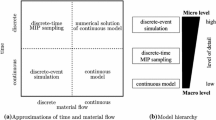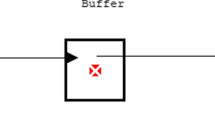Abstract
We consider a production system with finite buffers and arbitrary topology where service time is subject to interruptions in one of three ways, viz. machine breakdown, machine vacations or N‐policy. We develop a unified approximation (analytical) methodology to calculate the throughput of the system using queueing networks together with decomposition, isolation and expansion techniques. The methodology is rigorously tested covering a large experimental region. Orthogonal arrays are used to design the experiments in order to keep the number of experiments manageable. The results obtained using the approximation methodology are compared to the simulation results. The t‐tests carried out to investigate the differences between the two results show that they are statistically insignificant. Finally, we test the methodology by applying it to several arbitrary topology networks. The results show that the performance of the approximation methodology is consistent, robust and produces excellent results in a variety of experimental conditions.
Similar content being viewed by others
References
I.F. Akyildiz and H. von Brand, Computational algorithms for networks of queues with rejection blocking, Acta Informatica 26 (1989) 559–576.
T. Altiok, Approximate analysis of exponential tandem queues with blocking, European Journal of Operational Research 11 (1982) 390–398.
T. Altiok and H.G. Perros, Approximate analysis of arbitrary configurations of open queueing networks with blocking, Annals of Operations Research 9 (1987) 481–509.
M.H. Ammar and S.B. Gershwin, Equivalence relations in queueing models of fork/join networks with blocking, Performance Evaluation 10 (1989) 233–245.
S. Balsamo and V. de Nitto-Persone, Closed queueing networks, with finite capacities: blocking types, product-form solution and performance indices, Performance Evaluation 12 (1991) 85–102.
S. Balsamo and V. de Nitto-Persone, A survey of product form queueing networks with blocking and their equivalencies, Annals of Operations Research 48 (1994) 31–61.
G.R. Bitran and S. Dasu, A review of open queueing network models of manufacturing systems, Queueing Systems 12 (1992) 95–134.
G.R. Bitran and D. Tirupati, Multiproduct queueing networks with deterministic routing: decom-position approach and the notion of interference, Management Science 34(1) (1988) 75–100.
A. Brandwajn and A.K. Sahai, A note on approximate iterative solution of open tandem networks with blocking, Performance Evaluation 10 (1989) 211–218.
Y. Dallery, Approximate analysis of generalized open queueing networks with restricted capacity, Performance Evaluation 11 (1990) 209–222.
Y. Dallery and Y. Frein, A decomposition method for the approximate analysis of closed queueing networks with blocking, in: Queueing Networks with Blocking (Elsevier, North-Holland, 1989) pp. 193–209.
Y. Dallery and Y. Frein, On decomposition methods for tandem queueing networks with blocking, Operations Research 41(2) (1993) 386–399.
Y. Dallery and S.B. Gershwin, Manufacturing flow line systems: A review of models and analytical results, Queueing Systems 12 (1992) 3–94.
Y. Dallery, Z. Liu and D. Towsley, Properties of fork/join queueing networks with blocking under various operating mechanisms, IEEE Transactions on Robotics and Automation 13(4) (1997) 503–518.
M. DiMascolo, Y. Frein and Y. Dallery, An analytical method for performance evaluation of kanban controlled production systems, Operations Research 44(1) (1996) 50–64.
S.B. Gershwin, An efficient decomposition method for the approximate evaluation of tandem queues with finite storage space and blocking, Operations Research 35 (1987) 291–305.
S.B. Gershwin, Manufacturing Systems Engineering (Prentice-Hall, Englewood Cliffs, NJ, 1994).
H.D. Gosavi and J.M. Smith, An algorithm for sub-optimal routing in series-parallel queueing networks, International Journal of Production Research 35(5) (1997) 1413–1430.
S.M. Gupta, N-policy queueing system with finite population, Transactions on Operational Research 7(1) (1995) 45–62.
S.M. Gupta, Interrelationship between controlling arrival and service in queueing systems, Com-puters and Operations Research 22 (1995) 1005–1014.
S.M. Gupta, Machine interference problem with warm spares, server vacations and exhaustive service, Performance Evaluation 29(3) (1997) 195–211.
B.R. Haverkort, Approximate Analysis of Networks of PH/PH/1/K Queues with Customer Losses: Test Results, Annals of Operations Research 79 (1998) 271–291.
S. Helber, Decomposition of unreliable assembly/disassembly networks with limited buffer capacity and random processing times, European Journal of Operational Research 109 (1998) 24–42.
S. Jain and J.M. Smith, Open finite queueing networks with M/M/C/K parallel servers, Computers and Operations Research 21(3) (1994) 297–317.
L. Kerbache and J.M. Smith, The generalized expansion method for open finite queueing networks, European Journal of Operational Research 32 (1987) 448–461.
L. Kerbache and J.M. Smith, Asymptotic behavior of the expansion method for open finite queueing networks, Computers and Operations Research 15(2) (1988) 157–169.
D.D. Kouvatsos and I.U. Awan, MEM for arbitrary closed queueing networks with RS-blocking and multiple job classes, Annals of Operations Research 79 (1998) 231–269.
J. Labetolle and G. Pujolle, Isolation Method in a network of queues, IEEE Transactions on Software Engineering 6(4) (1980) 373–380.
A.M. Law and W.D. Kelton, Simulation Modeling and Analysis (McGraw-Hill, New York, 1991).
H.S. Lee, A. Bouhchouch, Y. Dallery and Y. Frein, Performance evaluation of open queueing networks with arbitrary configuration and finite buffers, Annals of Operations Research 79 (1998) 181–206.
C.M. Liu and C.L. Lin, An efficient two-phase approximation method for exponential tandem queueing systems with blocking, Computers and Operations Research 22(7) (1995) 745–762.
M. Nico and N.M. Van Dijk, A simple throughput bound for large closed queueing networks with finite capacities, Performance Evaluation 10 (1989) 153–167.
R.O. Onvural, Survey of closed queueing networks with blocking, ACM Computing Surveys 22(2) (1990) 83–121.
C.D. Pegden, R.E. Shannon and R.P. Sadowski, Introduction to Simulation Using SIMAN, 2nd ed. (McGraw-Hill, New York, 1995).
H.G. Perros, A symmetrical exponential open queue network with blocking and feedback, IEEE Transactions on Software Engineering 7 (1981) 395–402.
H.G. Perros, Queueing Networks with Blocking (Oxford University Press, New York, 1994).
H.G. Perros, Y.C. Liu and A.A. Nilsson, Approximate analysis of product-form type queueing networks with blocking and deadlock, Performance Evaluation 8 (1988) 19–39.
M.S. Phadke, Quality Engineering Using Robust Design (Prentice-Hall, Englewood Cliffs, New Jersey, 1989).
R. Rajan and R. Agrawal, Cyclic networks with general blocking and starvation, Queueing Systems 15 (1994) 99–136.
H. Sakasegawa and T. Kawashima, On the equivalence of three types of blocking in non-markovian tandem queues, Queueing Systems 16 (1994) 301–310.
J.G. Shantikumar and J.A. Buzacott, Open queueing network models of dynamic job shops, Inter-national Journal of Production Research 19(3) (1981) 255–266.
A.J. Singh and J.M. Smith, Buffer allocation for an integer nonlinear network design problem, Computers and Operations Research 24(5) (1997) 453–472.
C.A. Skianis and D.D. Kouvatsos, Arbitrary open queueing networks with server vacation periods and blocking, Annals of Operations Research 79 (1998) 143–180.
J.M. Smith and S. Daskalaki, Buffer space allocation in automated assembly lines, Operations Research 36(2) (1988) 343–358.
J.C. Strelen, B. Bark, J. Becker and V. Jonas, Analysis of queueing networks with blocking using a new aggregation technique, Annals of Operations Research 79 (1998) 121–142.
T. Tolio and S.B. Gershwin, Throughput estimation in cyclic queueing networks with blocking, Annals of Operations Research 79 (1998) 207–229.
E. Yannopoulos and A.S. Alfa, A simple and quick approximation algorithm for tandem, split and merge queueing networks with blocking, INFOR 32(4) (1994) 288–308.
D.D. Yao and J.A. Buzacott, Modeling class of state-dependent routing in flexible manufacturing systems, Annals of Operations Research 3 (1985) 153–167.
L. Zhuang, J.A. Buzacott and X.G. Liu, Approximate mean value performance analysis of cyclic queueing networks with production blocking, Queueing Systems 16 (1994) 139–165.
Author information
Authors and Affiliations
Rights and permissions
About this article
Cite this article
Gupta, S.M., Kavusturucu, A. Production systems with interruptions, arbitrary topology and finite buffers. Annals of Operations Research 93, 145–176 (2000). https://doi.org/10.1023/A:1018971822978
Issue Date:
DOI: https://doi.org/10.1023/A:1018971822978




